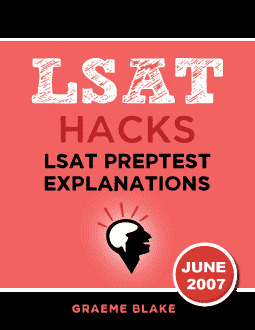QUESTION TEXT: Editorialist: News media rarely cover local politics…
QUESTION TYPE: Most Strongly Supported
FACTS:
Lack of news AND secret politics ➞ local politicians isolated from electorate ➞ less chance resident participation will get positive official response ➞ less resident participation
N AND SP ➞ PI ➞ OR ➞ RP
Note: I’ve drawn these as a conditional statement. But, they’re not actually conditional statements. They use words like “tends to”, “usually”, “rarely”. Those are less than 100% of the time, and so they’re not conditional words. I’m just using the arrows to show the flow of ideas. But, know that you can’t take the contrapositive of statements like these.
ANALYSIS: This whole stimulus is just one logical chain. The right answer will move from left to right on the chain.
___________
- This answer mixes up “less likely” and “unlikely”. We know that isolation makes politicians less likely to respond positively. But “less likely can mean 95% ➞ 85% or from 43% ➞ 2%
In other words, we can’t assume “likely” or “unlikely” just because something has become more likely or less likely. Unlikely is an absolute term, while more likely is a relative term.
This is a key distinction on the LSAT, so train yourself to spot the difference.
So, the reason this answer is wrong is that perhaps isolation only reduced the chance from 20% to 19%. Lack of isolation would leave positive responses more likely, but not actually likely. - We don’t know what should be true. The LSAT makes a strict separation between what is true and what should be. This stimulus is only about what is true.
- We don’t know this. We only know that the chance of positive reactions is a factor. There may be other, more important factors.
- CORRECT. This is valid. Lack of news (when combined with secret politics) isolates local politicians. Follow the chain in the facts section above, and that brings you to less resident participation.
- This tries to take the contrapositive of the chain. Even though I’ve drawn it as a chain of arrows, it’s not actually a conditional statement. Instead, the statements all use language like “tends to”. You only take the contrapositive of conditional statements: those that say what always happens, what will happen, what happens if something happens, etc.


Leave a Reply